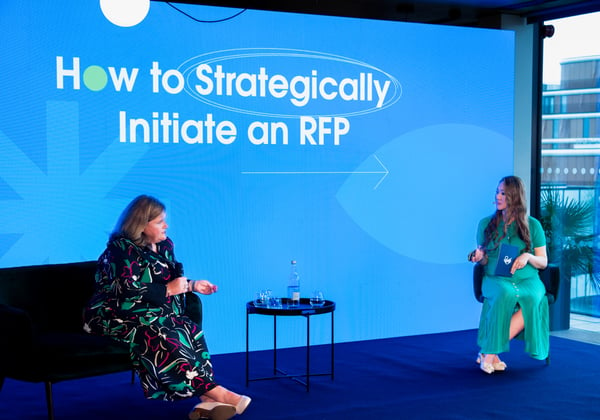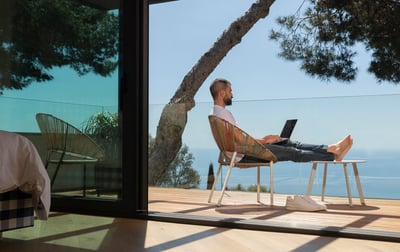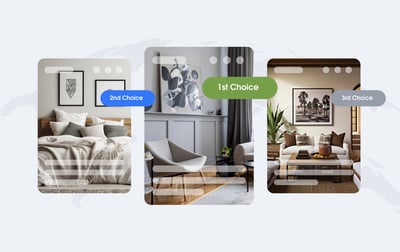
PwC first began working with AltoVita in 2023, and the rapid 5-month implementation led to a safe & secure integrated ecosystem that exclusively powers the “PwC Corporate Accommodation” programme.
The leading consulting company initially adopted the use of serviced apartments 15 years ago, as it saw the value in them, realising they were better for the wellbeing of its travellers, compared to small hotel rooms, which was particularly relevant for the London market.
Advantages of Serviced Apartments vs. Hotels
Serviced apartments offer many advantages for PwC employees. Integrating them into PwC’s overall travel programme leads to better employee wellbeing and greener stays, as well as cost savings.

“We’ve shown here a different selection of cities around the world. We’ve recently added Riyadh and Dubai due to the market booming at the moment. These are some examples, they might not be 100% accurate but it does show and illustrate that using serviced apartments can be very cost effective for many traveller programmes” Vivi Himmel, CEO and Co-founder of AltoVIta.
For Samantha Van Leeuwen, Head of Hotels and Venues at PwC, serviced apartments became “a home from home” for staff. She said they offer travellers their “own space”, which is important to the company from an employee diversity and neurodiversity point of view. Serviced Apartment clear benefits vs. hotels are fully equipped kitchen, laundry facilities, larger space, amongst others.
Speaking at AltoVita's Smart, Safe, Sustainable Summit, she noted that sustainability is also driving the choice towards them. Van Leeuwen said PwC had previously focused a lot on air travel emissions, and “shifted classes” which many people thought a consulting firm would never do. Now PwC is turning that attention to the hotel and serviced apartment sectors.
How AltoInsights enhanced spend control as well as CO2 emission and escalation reporting
Through AltoInsights, AltoVita’s sophisticated analytics and reporting dashboard designed to revolutionise corporate accommodation management, PwC is able to gain the full picture of its CO2 emissions reporting. PwC uses AltoVita’s EcoStats which is a carbon calculator that helps make informed decisions at the time of booking, which are then tracked and reported on AltoInsights. AltoInsights also gives a consolidated view of accommodation booking data. Real-time and historical booking data provide insights into trends, growth rates, cost savings, which drive opportunities for operational efficiencies.
Additionally. PwC also uses AltoVita’s Escalation Dashboard which offers 24/7 guest support, efficient incident recording, regionalised responses, and real-time status tracking. This enables PwC to take quick actions when needed.
“We can see the emissions, and now we can track the emissions. We want to provide a choice for our travellers, and our global mobility teams, because it's about all areas, not just just travel,” Van Leeuwen said.
As well as more sustainable stays, other Environmental, Social, and Governance (ESG) boxes are ticked. For example, In collaboration with AltoVita, PwC can see the modern slavery statements of its preferred properties.
Once the technology and systems are in place, one challenge is that many travellers book hotels as it’s what they’re used to. So PwC needed to drive awareness among employees that they should use serviced apartments, rather than the hotels. Van Leeuwen said she has done a lot of work over the years trying to convert employees from hotel to serviced apartment bookings, which has included internal marketing.
“If we spot anyone that wants a three nights or more stay, we'll actually contact them and say, no, actually you should be staying in a serviced apartment. We will try and switch people into serviced apartments, and with our global mobility teams as well,” she said.
“Once people go into a serviced apartment, there are very few people that actually move out of it.”
Consolidating spend of several departments has the potential to drive up to 48% in cost savings
During the fireside chat at the Smart, Safe and Sustainable Summit, Vivi asked Samantha,
“Since you started this movement many years ago already, can you walk us through what are the secrets to how you centrally consolidate and why consolidate the spend, not the teams but the actual spend of Business Travel and Global Mobility?”
PwC has pioneered uniting mobility with business travel for over a decade. It centrally consolidates the spend in several departments including projects, meetings & events, individual business travel and relocation, to drive volumes to preferred suppliers, and to then use this purchasing power to negotiate lower rates.
PwC wanted to get rid of a lot of the middlemen when it went to RFP last year, because there was,
“commission stacked on commission, stacked on commission” according to Van Leeuwen. “There's a whole load of double dipping in my view.”
She said apartment agencies make money, travel management companies make money, and the serviced apartment provider has to pay that commission.
“I'd rather it comes straight to us as a corporate,” Van Leeuwen said. “Obviously there's going to be one layer of middleman from putting the bookings through and such, which adds a huge amount of value because it's the centralised, consolidated route.
Watch Samantha Van Leeuwen, Head of Hotels and Venues at PwC talk at the Smart, Safe and Sustainable Summit 2024 about the benefits of consolidating spend for a successful accommodation programme.
Understanding the hotel pricing strategy: consolidate your purchasing power
The conversation carried on with Vivi asking Sam to elaborate more on the different rates that hospitality operators offer,
“I learnt a lot during my conversation with Sam last week, that there are multi-faceted areas of pricing, those are very technical hotel/procurement terminologies”.

“Revenue managers like to keep this to themselves” Sam stated, as hotels strategy consists on pushing you into the dynamic rates. What complicates the procurement of the programmes is all these different rates categories that bring different value.
- Static rate which is the fixed rate, if you have high volume then you can negotiate and price any additional amenities such as breakfast, check out, check in etc.
- Dynamic is the percentage that comes off the best available rate in the market, it can go up and down depending on seasonality. For example in Paris, with the anticipation of high volume hotel prices went up and the reality is that the demand is lower than anticipated hence the prices going down again. In the leisure world that is capped, in the corporate world that is not capped.
- Chainwide is the rate that goes across the properties of the percentage of the best available rate. Depending on your volume, this rate allows you to negotiate.
- BAR, the best available rate is the highest pricing module.
In serviced apartments it’s not that complicated but how it feeds into online tools in so many different ways makes the landscape for hotel purchasing complicated.
For a solid corporate managed accommodation programme you should always opt for the static negotiated rate based on the volume.This drives the most value.
Here is an example of negotiated rates fetched from AltoInsight and how powerful a consolidated purchasing can be. If you were to apply for managed corporate accommodation then you can negotiate using your purchasing power. Location and room type may different but you can achieve better 20 to 48% of cost saving.
“Our Global Outbound where our TMC was not able to do some project business we switched to AltoVita because of the savings driven by serviced apartment vs hotels.” Samantha Van Leeuwen.
Don’t let Loyalty Programmes drive your corporate accommodation strategy
Another barrier to promoting serviced apartments is employees may book hotels in order to boost their loyalty points and status, even for longer stays. It was more of a challenge in the US market.
“We discussed the challenges of educating the serviced apartment asset class, particularly in the US. The US breathes a loyal programme. You mentioned something important the other day, don’t let your strategy be driven by a loyalty programme.” Vivi Himmel.
Van Leeuwen agreed and argued that a corporate accommodation strategy should not be driven by a loyalty programme, as this means the best rates won’t always be achieved.
“That is something I push to all our territories,” she said. “By opening the doors to loyalty, these loyalty programmes and the points that come from that actually means you are driving all your business to one area, which takes away pretty much 80% of your negotiation skills, because then you have to try and switch it. If it's a long stay, it absolutely should be a serviced apartment. If you're just going to do one or two nights, go and get your points.”
Fast mobilisation of employees powered by AltoVita integration with International SOS, in case of emergency
Centrally consolidating business travel and mobility also means better security for travellers and assignees. Thanks to the integration with International SOS, PwC now has access to real-time data on the travellers’ locations and property locations. All these ensure travellers are well-prepared and supported globally, as well as allowing Global Mobility and Travel Managers to mobilise employees in a timely manner during any emergency situation.
“If anything happens somewhere in the world, one of our security, global security teams can pull that data,” said Van Leeuwen. “Global mobility hadn't had that previously. … they would have had to pull up a spreadsheet and then start calling people … whereas now we've brought that together.”
Health and safety of the apartments in PwC’s network are also verified under AltoVita’s Breezeway accreditation. There are many benefits, including improved safety tracking, reduced number of escalations, reduced time spent on escalations, improved confidence in serviced apartments versus hotels and improved supplier management.
Duty of care is paramount, and that’s also reflected in its ban on the use of Airbnb properties.
Watch Samantha Van Leeuwen, Head of Hotels and Venues at PwC talk at the Smart, Safe and Sustainable Summit 2024 about the benefits of consolidating spend for a successful accommodation programme.
Co-designing Together - AltoVita’s Agility & flexibility allows for fast implementation
Elevating a well-curated corporate housing programme is no small feat, yet AltoVita integrated its platform and created a safe & secure ecosystem for PwC within 5 months. The process involved customisation with co-designed products like AltoCurate and AltoSearch. Then the platform was connected into PwC’s extranet, which includes integration with Workday (PwC’s HRIS), International SOS and other platforms, including relocation management companies, which helps streamline the relocation workflow.

Features such as Single Sign-On (SSO) via Workday, bespoke contact options, privacy policy popups, and role-specific menu configurations enhanced user experience. API integrations with PwC internal systems optimised processes and reduced booking processing times, resulting in cost savings.
“We’ve got the technology but we still need the human part to answer the challenges and issues that come through is still very important. We’ve also introduced a WhatsApp channel for all communication which was hugely successful. At the end of the line there is someone to pick up the phone.” Sam stated.
Vivi then agreed by saying that AltoVita operated on the “High touch high service delivery” which is key for fortune 500 companies like PwC.
How to strategically initiate an RFP process - Find out how PwC did it in less than 1 year
To strategically initiate an RFP for serviced apartments, Van Leeuwen urged companies to bring all the departments together, and look at the data, to see what each department does.
“Then it’s a case of educating people,” she said, highlighting how procurement can differ in different departments, such as accommodation buying compared to mobility.
So it was important to bring specialists together, then write an RFP that suits all the various stakeholders - “otherwise you won't get buy-in from the business … you have to go to the leadership board and say, this is what my proposal is, that this is what I think we should be doing.”
Van Leeuwen also needed to allay fears around the idea of “merging” programmes. “Commercially it wasn't easy because naturally people think you're going to take over. And it wasn't about taking over, it's out about working collaboratively with the teams,” she said.
She discussed with the global mobility division that they were going to use the same suppliers, and that the team would keep their same processes. It was more about streamlining, which both sides benefit from. She also brought in some of the HR teams, such as student teams, to explain the same proposition: “you are actually paying more in the same venue.”
AltoVita has managed to achieve all of these milestones in less than one year.

Van Leeuwen said at the start of the RFP process, not much was known about AltoVita.
“Then we had a conversation and thought, no, actually (AltoVita) can bring quite a few things to the market. And it's been a bit of a game changer because if I was a betting person, I probably would not bet on AltoVita doing that, because it was inexperienced in some areas,” she told the audience.
“But I've been so impressed with the agility and the flexibility of where we've got to. We awarded the contract at the end of July, started writing the contract in August and we were live then by September. We had a lot of other suppliers who were very cynical in the marketplace that AltoVita could do it. That's the worst thing to say to me because I'm just gonna prove them wrong.”
All the challenges and obstacles that we were being faced with were handled with care and agility ensuring PwC’s consolidated accommodation programme is a success.
Looking Ahead
Serviced apartments are growing in popularity for PwC as many employees have moved out of London, but come to the capital perhaps four days a week, for a couple of months.
“One of the things that we often ask for now is having somewhere they can store their luggage, or their toiletries, because they're going to come back next week. And that's quite a big part of our business now. We have more people regionally, so we have more people travelling into the capital,” she noted.
PwC is also growing the numbers of travellers to Dubai, where AltoVita offers a range of cost effective accommodation.
The journey will now continue with AltoVita - following the unprecedented 5-months implementation and integration.
Watch Samantha Van Leeuwen, Head of Hotels and Venues at PwC talk at the Smart, Safe and Sustainable Summit 2024 about the benefits of consolidating spend for a successful accommodation programme.


